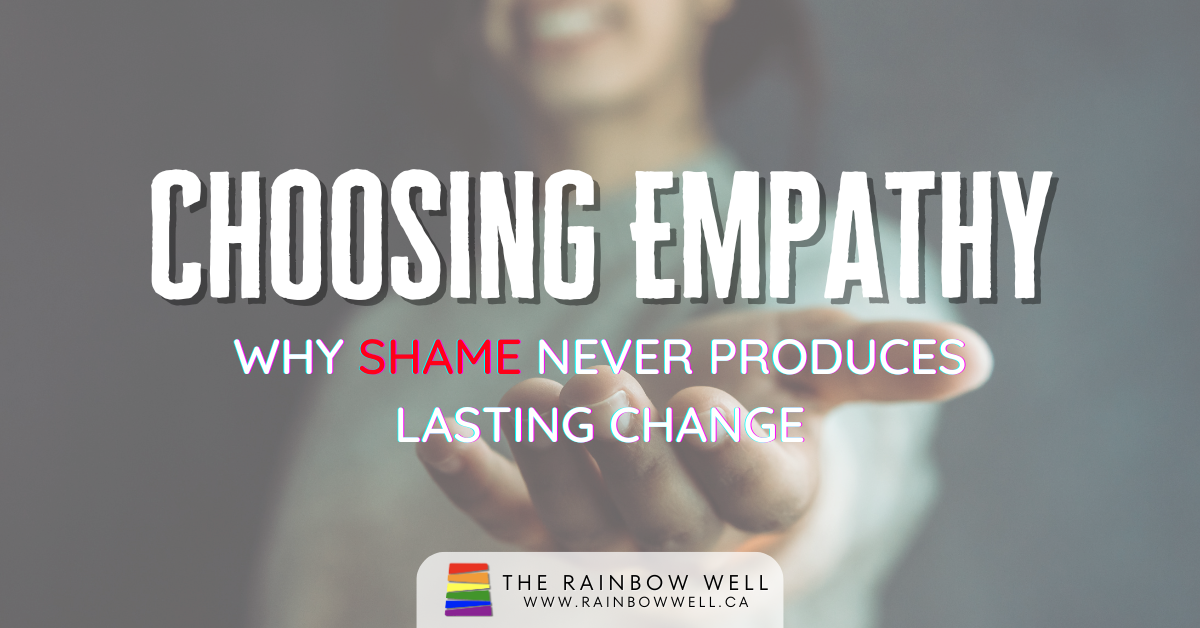Choosing Empathy: Why Shame Never Produces LAsting Change

Some time ago, I got into it with someone who commented on one of my posts after they made some wildly uninformed and outright false statements about 2SLGBTQIA+ people. Despite trying to respond clearly and politely to them, their responses remained hostile, inflammatory, and completely closed to genuine engagement.
What made their words stand out to me, however, was that they were couched in Christian language that confidently asserted that their views were not only unquestionably and obviously true, but ultimately loving.
While others in the thread seemed shocked by her tone and words, I was not. It was all too familiar. I have been in countless other conversations exactly like this one. So, I made my case as clearly as I could (more so for other readers than for this person) and moved on.
If I am being honest, I have not always responded to these kinds of exchanges in this way. In the past, I would react by decimating their shallow arguments, undermining the flawed basis of their convictions, and calling into question their integrity as Christians. In other words, I would shame them. And, just for a moment, such a response felt good, especially when others would pile on their agreement. So why did I stop?
Reasons To Resist Shame
In addition to being generally unnecessarily unkind, the truth is that shame is ultimately not very effective. If my only goal is to score points and feel good, shame works wonders. However, it not only doesn’t change hearts and minds, but it also tends to entrench those hearts and minds even further into the protection of their certainty. In other words, I end up making the problem worse for everyone else.
Another reason I no longer respond in this way is that I used to be that person on the other side. Raised in a fundamentalist church culture, I held many of the same beliefs, used some of the same arguments, and felt strongly about the veracity of my convictions and the character of my motivations. I truly and deeply felt that my beliefs, words, and actions were good and right.
Of course, this does not excuse people who do this (myself included). After all, sincerity does not guarantee morality, any more than intention negates impact. However, understanding and acknowledging that sincerity can sometimes serve as a guide to working for meaningful change. (As a important aside, changing the mind of any ideological fundamentalist is hard work and generally has a low rate of success. So, as much as we need to learn how to do it well, we also need to learn when to simply move on.)
Tactics For Change
That being said, here are some of the things I’ve learned from changing my approach away from shame. First, as I said earlier, we need to recognize that shame-based approaches (even when done in good faith) almost always backfire. While some people can be drawn into a space of contrition through empathy, trying to make someone “feel bad” for their beliefs rarely has the desired outcome.
Second, while we need to be reasonable, we also need to recognize that reason isn’t the field where the battle is being waged. This is especially true around certain religious traditions, where there is a significant reliance on intuition. At its worse, it can become an anti-intellectualism that can see sound reason (and even science) as evidence of moral compromise. While not universally a problem, it’s one factor that needs to be assessed early on.
Third, we need to change (and diversify) how we communicate our ideas. When engaging with evangelical Christians, for example, I will often utilize language and concepts that are familiar to them, integrating them carefully with new ideas. This is what renowned author and psychologist Howard Gardner calls “representational redescriptions”:
“Get the message out in lots and lots of different ways, lots of different symbol systems, lots of different intelligences and lots of different embodiments. The notion that you say it once and it gets through is just wrong. So is the notion that you can simply repeat yourself. You have to be extremely resourceful in finding diverse ways to get the same desired mind-change across.”
I want to be clear that I am not advocating for manipulation. I am not suggesting that we use sneaky tactics to undermine an adversary. Rather, this is about recognizing that minds are hard to change (including our own). And so finding ways that connect in terms and contexts that are familiar with our listeners is crucial for understanding and possible change.
Calling Out & Calling In
Most of us are familiar with the idea of calling someone how, but fewer are aware of the practice of “calling in”. “Calling out” involves bringing public attention to harmful words or behavior, with the goal of reducing their negative impact. In contract, “calling in” is an empathy-based approach that uses conversation to address the problems in private (at least initially).
There are circumstances where both approaches are necessary but failure to consider both options often results in simply escalating conflict and division. Our ultimate goal should be protecting the vulnerable and effecting systemic change. By utilizing shame, we risk dehumanizing both the people we are seeking to help and those we are hoping to change.
No matter what approach you take, the chances of effecting change without genuine human connection are low. This is why careful and calculated vulnerability and empathy are critical for changing minds. People are more likely to be open when they see it first demonstrated. This is not easy. Vulnerability is, by its very nature, risky. When we risk it, though, we send an important message.
. . .
by Jamie Arpin-Ricci (he/him), founder of The Rainbow Well

